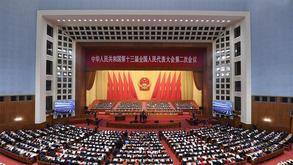 The second session of the 13th National People's Congress opens at the Great Hall of the People in Beijing, China, March 5, 2019. (ZHANG LING / XINHUA)
The second session of the 13th National People's Congress opens at the Great Hall of the People in Beijing, China, March 5, 2019. (ZHANG LING / XINHUA)
The top legislature is expected to decide on Wednesday on the exact timing of this year's plenary session of the National People's Congress, after the nation's most important annual political event was postponed due to the novel coronavirus epidemic.
The annual plenary session of the National People's Congress, which normally opens in early March, was postponed due to the novel coronavirus epidemic
A draft decision on the opening date of this year's full session of the NPC was submitted for review on Sunday to the bimonthly meeting of the NPC Standing Committee, according to an official release. The meeting is scheduled to end on Wednesday. No details were disclosed.
ALSO READ: China's top legislature starts standing committee session
The annual plenary session of the NPC normally opens in early March. About 3,000 national legislators from across the country gather in Beijing to review work reports from the central government, as well as the nation's highest court and procuratorate, the budget and the national economic and social development plan. In some years, they also deliberate on key bills or elect State leaders.
However, the NPC Standing Committee decided in February to postpone the third plenary session of the 13th NPC, as the nation was focusing on fighting the COVID-19 outbreak at the time and many national legislators were working on the front line of the battle.
Also on the agenda of the bimonthly meeting of the NPC Standing Committee are draft revisions to the Law on Animal Epidemic Prevention and the Law on the People's Armed Police Force. A draft amendment to the Copyright Law was also submitted to the top legislature for the first reading on Sunday.
READ MORE: China's legislature bans illegal trade in, consumption of wildlife
In the following three days, the legislature will also have a second review of a draft biosecurity law, and a draft law on administrative discipline-a law to strengthen supervision over everyone who exercises public power in the public sector.
A draft revision to the Law on the Prevention and Control of Environmental Pollution by Solid Waste will go to a third reading.
The latest version has proposed strengthened management of medical waste, especially how to manage medical waste in major infectious disease epidemics.
Draft laws are usually reviewed three times by the top legislative body before being adopted, according to the Legislative Law.
Lawmakers have also been deliberating a draft decision to authorize the State Council to temporarily adjust relevant laws and regulations in the Hainan pilot free trade zone and a report on environmental protection.
Xinhua contributed to this story.


